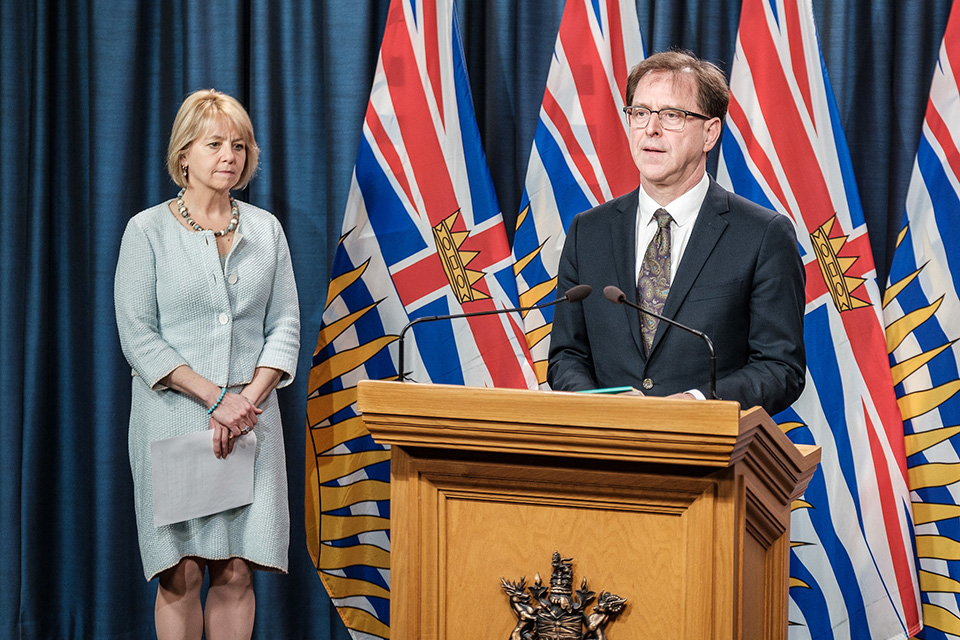Experts on reopening BC
Human and Social Development, Peter B. Gustavson School of Business, Social Sciences, Science

The following University of Victoria experts are available to media to discuss the provincial government’s plan to reopen BC during COVID-19.
Elizabeth Borycki (Health Information Science) can speak about major advances in care from a health informatics and health information technology perspective. Her background in health information technology design and implementation has led to a deeper understanding of patient safety and high-tech competencies in telehealth, home health monitoring and mobile health. (Email at emb@uvic.ca)
Kristin Brandl (Gustavson School of Business) is an expert in international business and global value chains. She can speak about the business impacts of COVID-19 on international firms and the role of China in the global supply chain. (Email at kbrandl@uvic.ca)
Astrid Brousselle (Public Administration) is an expert in health as it relates to human and ecological transitions over time. She is director of the School of Public Administration and can speak about how reopening the economy could ease current economic and social pressures while providing government with a rare opportunity to create more effective systems during this transition. (Email at astrid@uvic.ca)
Catherine Costigan (Psychology) is an expert in working with vulnerable families experiencing mental health challenges. She explores relationships within families, including parent-child, co-parents and siblings, and how families are affected by external stressors. She can comment on how people may adapt to reopening BC and the mental health impact this may have on families. (Email at costigan@uvic.ca)
Susan Duncan (Nursing) is an expert in public health nursing and primary health care. As director of the School of Nursing, she works closely with Island Health and the BC Ministry of Health and has played a front-line role in placing student nurses during the COVID-19 pandemic response. (Email at nursingdirector@uvic.ca)
David Dunne (Gustavson School of Business) is director of MBA programs and an expert in design thinking and creative problem solving. He can speak about how government has an opportunity to redesign the way we operate to achieve a stronger and healthier society. (Email at dldunne@uvic.ca)
Stacey Fitzsimmons (Gustavson School of Business) is an expert on helping people work effectively within diverse and multicultural workplaces. She can share evidence about equity and fairness across employee demographics during the reopening of BC, how closed borders and an increased sense of nationalism can increase workplace ethno-centrism, and how managers can rebuild connections among employees. (Email at sfitzsim@uvic.ca)
Rob Gillezeau (Economics) is an economist with expertise in public policy. He can speak about the economic value of BC’s public health measures and compare the province's measures to other jurisdictions, as well as best practices in reopening the economy, including child care provision measures. He can also speak about the depth of the economic decline and what economic stimulus should look like after the COVID-19 pandemic is eventually contained. (Email at gillezr@uvic.ca)
Frederick Grouzet (Psychology) is a social psychologist who can speak about people’s perception of risk, their reaction to public health messaging and their motivation to adapt to new behaviours as BC moves to reopen during COVID-19. He can also comment on the approaches of European Union countries such as France and Sweden to the pandemic. Grouzet is also French-fluent. (Email at fgrouzet@uvic.ca)
Nathan Lachowsky (Public Health and Social Policy) is gathering evidence to support a national HIV and AIDS prevention strategy. He can speak about the impacts of COVID-19 public health measures on LGBTQ2 people with respect to their social, mental and sexual health. (Email at nlachowsky@uvic.ca)
Bonnie Leadbeater (Psychology) is an expert in mental health of children and adolescents and the role of peer victimization in the development of depression and problem behaviors. She can speak about what new rules around physical distancing mean for youth and the judgement of other people’s behaviour that often accompany social change. (Email at bleadbea@uvic.ca)
Matthew Little (Public Health and Social Policy) is an epidemiologist researching how COVID-19 has exposed weaknesses in local and global food production and supply. He can share insights on current gaps in food security and sovereignty that have resulted in heightened inequities in access to food, and which may lead to issues regarding nutritional health. (Email at matthewlittle@uvic.ca)
Junling Ma (Mathematics and Statistics) is an expert in the mathematical and statistical modelling of the spread of infectious diseases, optimal control strategies and the spread of specific diseases such as influenza, HIV, Ebola and cholera. (Email at junlingm@uvic.ca)
Bernie Pauly (Nursing / Canadian Institute for Substance Use Research) is an expert on harm reduction as it relates to how COVID-19 pandemic orders impact the overdose emergency. Pauly can talk about the need for planning, funding and organizing a safe drug supply, de-criminalizing drug use, housing the homeless and enhancing outreach services to reduce substance use related harms, including overdoses. (Email at bpauly@uvic.ca)
Michael Prince (Social Policy) is an expert in disability, public health, social policy and public administration. Recently appointed to the federal government’s COVID-19 disability advisory group, and also chair of Community Living BC, Prince can speak about how the pandemic impacts people with disabilities and what government can do to improve their quality of life. (Email at mprince@uvic.ca)
Brock Smith (Gustavson School of Business) is an expert on marketing strategy and new venture marketing. He is able to speak about the business impacts of COVID-19 on entrepreneurial organizations, as well as consumer behavior related to the coronavirus. (Email at smithb@uvic.ca)
Kelli Stajduhar (Nursing / UVic Institute on Aging and Lifelong Health) is an expert on palliative care and is focused on bringing end-of-life services to Victoria’s most vulnerable population. Stajduhar can speak about how the pandemic has affected individuals who are homeless or close to homelessness, and who struggle to access care. (Email at kis@uvic.ca)
Bruce Wallace (Social Work) is an expert on harm reduction as it relates to substance use. He is co-leading a research project providing drug-checking analysis for people who use street drugs that have become increasingly unsafe during the pandemic crisis. Wallace can speak about this dual public health emergency and the argument for maintaining a safe drug supply. (Email at barclay@uvic.ca)
Note: Please use email as first point of contact for all experts. During this time, not all experts will be able to respond immediately to your request. Please cc Stephanie Harrington and/or Suzanne Ahearne so we can provide additional support as needed. Broadcasters: Experts' access/availability via Skype/FaceTime varies. Please ask individually.
Photos
Media contacts
Tara Sharpe (University Communications + Marketing) at 250-721-6248 or tksharpe@uvic.ca
Suzanne Ahearne (University Communications + Marketing) at 250-721-6139 or sahearne@uvic.ca

